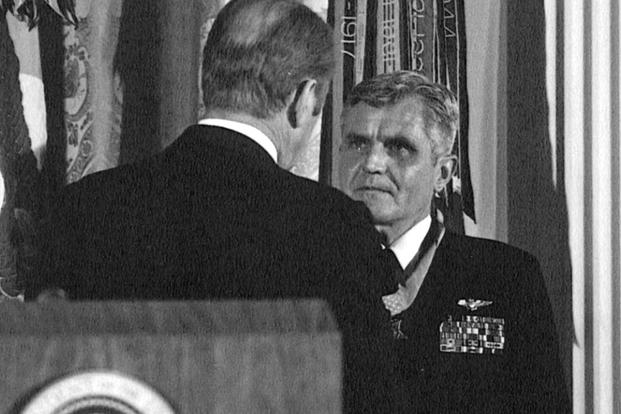In September 1969, then-Capt. James B. Stockdale had just been caught in his third attempt to organize his fellow prisoners of war in resistance against their Viet Cong captors. After four years of torture, solitary confinement and mistreatment in the notorious "Hanoi Hilton," Stockdale felt he had to take drastic measures.
"I was at the end of my string," he told Congressional Medal of Honor Society head Edward Murphy. "I had been through 13 different torture sessions. I didn't want any more men to suffer as a result of my actions."
Rather than risk revealing the names of his co-conspirators, Stockdale crawled to the tiny window in the room used for torture sessions. Despite being hobbled by leg irons, he broke the glass and slashed his wrists with shards of it. He knew no matter what happened, his death by suicide would reinforce his message of resistance to his captors and comrades alike.
The North Vietnamese found their senior naval prisoner before he bled to death. They revived him and indicated they were impressed by his willingness to give up his own life. His Medal of Honor citation reads: "... convinced of his indomitable spirit, [the North Vietnamese] abated in their employment of excessive harassment and torture toward all the prisoners of war."
Stockdale was not released until 1973. He had been held for 7½ years -- four of those spent in solitary confinement, two of them in leg irons. Upon returning to the United States, Stockdale returned to active-duty military service -- but not to his dream of commanding an aircraft carrier. After 37 years of service, Stockdale retired and has been a fellow at the Hoover Institution in California for 12 years. His official biography there states: "His writings have been many and varied, but all converge on the central theme of how man can rise in dignity to prevail in the face of adversity."
This could be called his life's theme. When Stockdale's plane was shot down over Vietnam, his knowledge about the Gulf of Tonkin incident could have been extremely valuable to his captors -- yet he never revealed that information. "I know that pride and self-respect lead to aggressiveness, and aggressiveness leads to a deep sense of joy when one is under pressure," Stockdale wrote recently. He demonstrated during his long imprisonment that even the most impossible conditions can breed dignity and courage.
Want to Know More About the Military?
Be sure to get the latest news about the U.S. military, as well as critical info about how to join and all the benefits of service. Subscribe to Military.com and receive customized updates delivered straight to your inbox.














